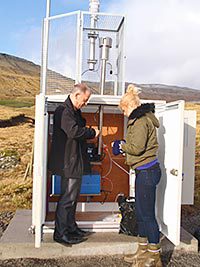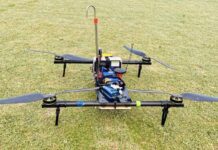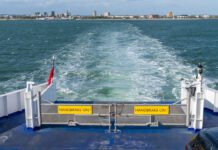
THE Environment Agency of the Faroe Islands together with the municipality of Tórshavn has installed two ambient air quality monitoring stations as part of its commitment to monitor the environment and provide air quality data to the public and other interested parties. The stations, which were supplied by Air Monitors Ltd, provide continuous meteorological measurements and air quality data for NO2, NOx and a range of different particulate factions.
Rakul Mortensen, an Environmental Chemist for the Agency, is responsible for air quality monitoring. She says: “Air quality measurements have been made in the past, but only on a short-term basis by researchers and consultants, so we are absolutely delighted to be able to conduct our own continuous monitoring, so that we can establish a database of background air quality data.
“The creation of two sites, one urban and one rural, will enable us to determine whether any pollution incidents have arisen from local sources or externally. For example, we received a significant quantity of dust following the volcanic eruptions that took place in Iceland in 2010 and this equipment will enable us to measure any future instances with greater accuracy, so that we can provide the public with informed advice and reassurance.”
One of the stations was installed in a remote rural location and the other was installed in Tórshavn in the main urban area near the harbour, which is the area most likely to be affected by local sources of pollution.
The Faroe Islands is an autonomous country within the Kingdom of Denmark but is not part of the European Union so it does not have to comply with EU Air Quality Directives. However, the Environment Agency is keen to be able to provide the Islands’ 50,000 population with information on air quality.
Rakul says: “The main factors affecting air quality are likely to be road traffic and emissions from the large number of ships that travel to and from the Islands’ ports.
However, the monitoring stations have already demonstrated that air quality in the Faroes is generally good, and well within the requirements of the EU air quality standards.”
Target gases
Each of the two monitoring stations included a Thermo Gas analyser Model 42i measuring NO, NO2 and NOx in addition to a Lufft WS600 smart weather sensor for measuring wind speed and direction, temperature, humidity, pressure and precipitation.
Particulate monitoring is being undertaken with the most advanced technology available; each station has been equipped with a FIDAS (Fine Dust Analysis System) which provides continuous real-time simultaneous mass concentration measurements of TSP, PM1, PM2.5 and PM10, and provide additional information on particle size distribution from 0.18 to 18 microns and particle number in each size range. All of the monitoring equipment is connected to web loggers manufactured by Envirologger, Air Monitors’ sister company.
Jim Mills, Air Monitors’ MD, travelled to the Faroe Islands in March 2014 to assist with the installation of the monitoring stations. He said: “The monitors are similar to many of the stations that we have installed in the UK; they are fitted with web loggers that utilise cloud storage for the data and our software engineers are working with the Environment Agency of the Faroe Islands to develop a website so that the public will have quick and easy access to air quality data.”







